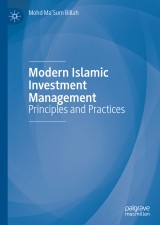Details

Modern Islamic Investment Management
Principles and Practices|
85,59 € |
|
| Verlag: | Palgrave Macmillan |
| Format: | |
| Veröffentl.: | 04.07.2019 |
| ISBN/EAN: | 9783030176280 |
| Sprache: | englisch |
Dieses eBook enthält ein Wasserzeichen.
Beschreibungen
Islamic finance has grown exponentially since 1963 and has reached more than 70 countries around the world with the asset size of about $2.5 trillion. The Islamic investment system today comprises of both asset-backed and asset-based offerings. There is an evidence of sustained demand for Islamic investment in the global market among both Muslim and non-Muslim investors with demand outstripping supply and management. This book is a timely guide to understanding the paradigm of Islamic investment and its application in the contemporary investment reality, and will be of particular interest to academia, industrialists, professionals, investors, investment managers, product designers, students, decision makers and policymakers globally in the field of investment.<p></p>
<p>1. Islamic Investment Paradigm.- 2. Islamic Fund Management.- 3. Shari’ah Frameworks of Investment.- 4. Islamic Investment Policies.- 5. Islamic Personal Investment.- 6. Al-Musharakah Venture Capital.- 7. Islamic Micro-Investment.- 8. Islamic Investment in Stocks.- 9. Investment in Sukuk.- 10. Wealth Investment under Shari’ah.- 11. Investment in Islamic Unit Trust.- 12. Halal Investment in Sustainable Development Growth.- 13. Investing of Takaful Funds.- 14. Experiencing Investing in Takaful Funds.- 15. Investment in Cryptocurrency.- 16. Foreign Investment under Shari’ah.- 17. Rate of Return in Islamic Investment.</p><br>
<p><b>Mohd Ma’Sum Billah </b>is Professor of Finance and Insurance at the Islamic Economics Institute, King Abdulaziz University, Saudi Arabia. He is a member of various organizations and groups, including the working group of the Shari'ah Compliance functions, the AAIOFI Governance & Ethics Board (AGEB), AAIOFI, Bahrain and the Audit Committee, ACIG, Saudi Arabia alongside being an advisor to ICMIF, London. He is an author of 31 books and chapters in several books in the areas of Islamic and comparative finance, insurance, investment, capital markets, business, asset management and e-Commerce. He has also published more than 150 articles in Islamic and comparative finance, banking, capital markets, insurance, business and social finance and completed nine funded research projects successfully on different issues of Islamic and comparative finance and commerce funded by the Malaysian government and the Central Bank. He has presented more than 200 papers and lectures at conferences, summits, conventions, seminars, executive workshops and forums in the specialized issues of Islamic finance, insurance, capital market, investment, business, social finance and cryptocurrency.<br></p>
Islamic finance has grown exponentially since 1963 and has reached more than 70 countries around the world with the asset size of about $2.5 trillion. The Islamic investment system today comprises of both asset-backed and asset-based offerings. There is an evidence of sustained demand for Islamic investment in the global market among both Muslim and non-Muslim investors with demand outstripping supply and management. This book is a timely guide to understanding the paradigm of Islamic investment and its application in the contemporary investment reality, and will be of particular interest to academia, industrialists, professionals, investors, investment managers, product designers, students, decision makers and policymakers globally in the field of investment.
Outlines the paradigm of Islamic investment Showcases the principles of Islamic investment products, management and their mechanisms Includes academic, empirical and hypothetical solutions to serve as a guide for academics, students and practitioners
The conventional model of investment in most cases involves fixed interest over a debt-based deal, gaining by transferring the risk to others. Investment sectors are not necessarily ethically compliant as commercial gain is the priority over ethical compliance and/or humanitarian concern. Alternatively, the Islamic investment model in the contemporary reality is based on the Shari’ah principles with an integrated concern free from any interest (usury) while gain is realized upon sharing the risk and formalized on an underlying asset with transparency. Investment sectors are strictly screened by ensuring one to be free from unethical elements while caring about socio-humanitarian concern. An Islamic investment model thus advocates beneficial opportunities for all regardless of one’s religious background or gender to participate in and benefit over a debt-free asset-based economy with a risk-sharing platform. Hence, this book is a timely guide to understanding the paradigm of Islamic investment and its application in the contemporary investment reality of particular interest to students, academics, and investment professionals.<br><p></p>
Diese Produkte könnten Sie auch interessieren:

A Sea Change: The Exclusive Economic Zone and Governance Institutions for Living Marine Resources

von: Syma A. Ebbin, Alf H. Hoel, Are Sydnes

96,29 €















